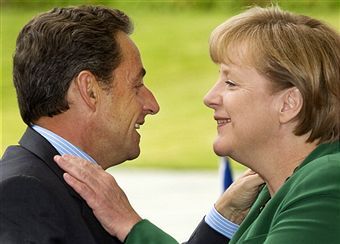 “I’m very worried, this building [the Treasury] is very worried and this
government is very worried,” said George Osborne of the unfolding crisis in the Eurozone. In an interview with the FT, the chancellor goes on to say that he is in constant contact with his
continental counterparts and urges them once again to “get a grip”.
“I’m very worried, this building [the Treasury] is very worried and this
government is very worried,” said George Osborne of the unfolding crisis in the Eurozone. In an interview with the FT, the chancellor goes on to say that he is in constant contact with his
continental counterparts and urges them once again to “get a grip”.
Eurozone leaders are meeting today to discuss further loans to Greece. Three options are being considered: first, an extension of the European Financial Stability Facility; second, private sector creditors re-lend money for a longer period and at a lower rate; third, impose a tax on banks to secure revenue for Greece. Despite a crisis meeting in Berlin last night between Sarkozy and Merkel, European leaders are yet to alight firmly on any option, although there are rumours of a ‘common Franco-German position’. The uncertainty is an indication that leaders are either content to muddle on through or hampered by the EU’s convoluted policy procedures, depending on which commentators you read.
Whatever its cause the ongoing political impasse has left Greece economically imperilled. It is paying an eye-watering 18 per cent on 10 year money from the EU and its public services are collapsing under the strain: multinational pharmaceuticals have already ceased to supply its bankrupt hospital authorities with non-essential drugs. There have been discussions about reducing these colossal interest repayments, but the proposal can be discarded for the moment because Angela Merkel, wary of exasperated German voters, has rejected it unless other creditors take the same hit.
So, the prospect of concluding this summit definitively is entertained more in hope than expectation. Greece is merely the prelude to a more serious drama about the euro itself. Movement on the bond markets suggests that crisis now lours over Spain and Italy, which account for 28 per cent of the Eurozone’s GDP, and the markets and global institutions are preparing for contagion. In a report published this week, the IMF urged the Eurozone to stave-off disaster by integrating in order to calm the markets. The Fund said, “incomplete economic and financial and fiscal integration is casting a shadow on the future of Economic and Monetary Union.”
It is assumed by many that the Eurozone’s crisis can only be resolved by integration or destruction. Angela Merkel does not share this view, judging by her public statements at any rate. She said over the weekend, “It’s entirely about creating a controlled, composed process of gradual steps and measures.” That may involve integrated measures to improve competitiveness in the region; it may include a harmonised system of Eurozone bonds, which is being considered by Brussels at the moment. These are ‘gradual steps’ towards a solution; it does not sound like Merkel favours a fiscal and financial union with the basket-case economies bordering the Mediterranean. Besides, as Anthony Browne, says in the cover story in the latest issue of the Spectator (subscribers here), national parliaments are ‘dumping their Euro-federalist baggage’ in the face of waning public support for the EU. The trouble is: it may take something dramatic to check the deepening malaise.






Comments